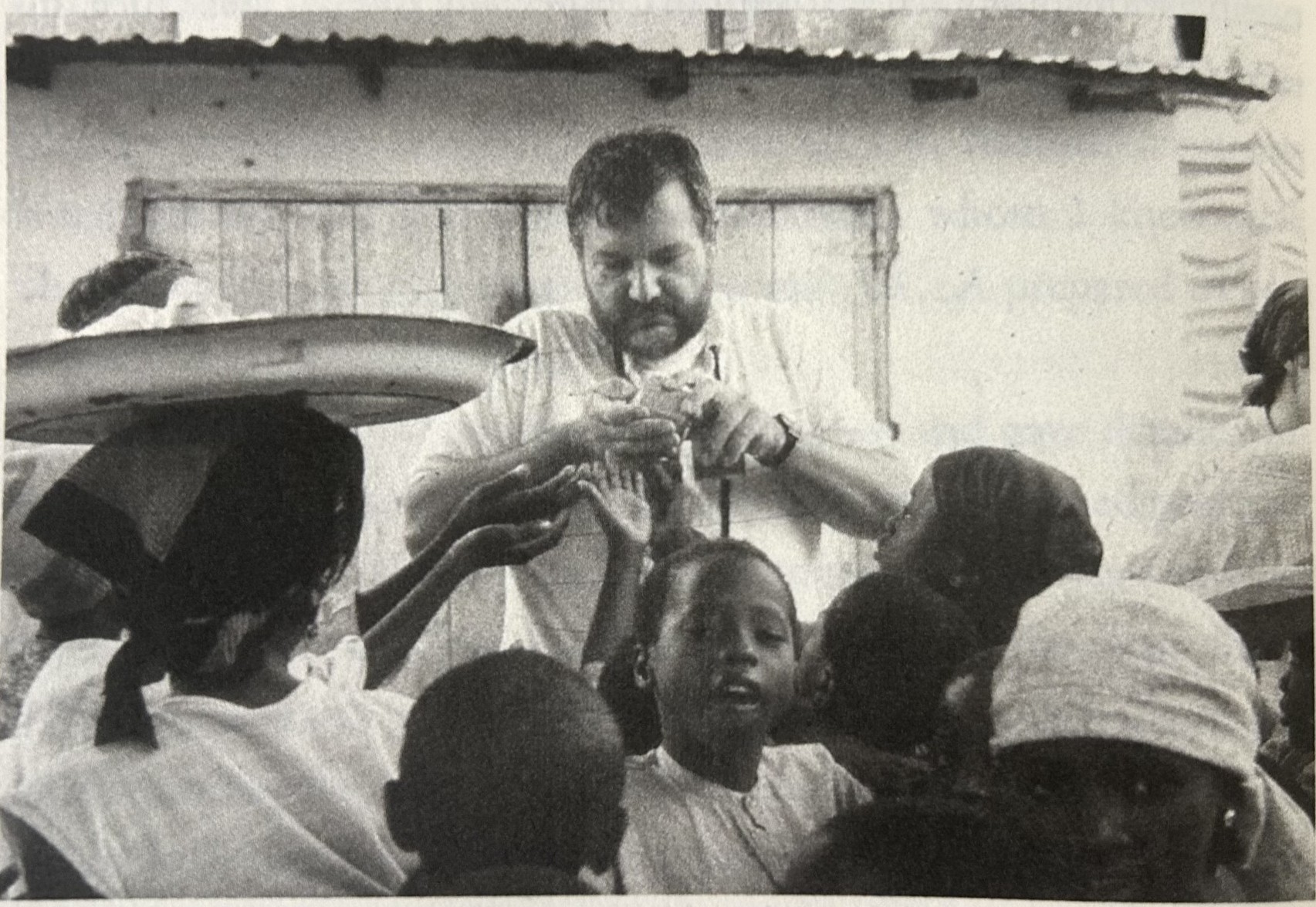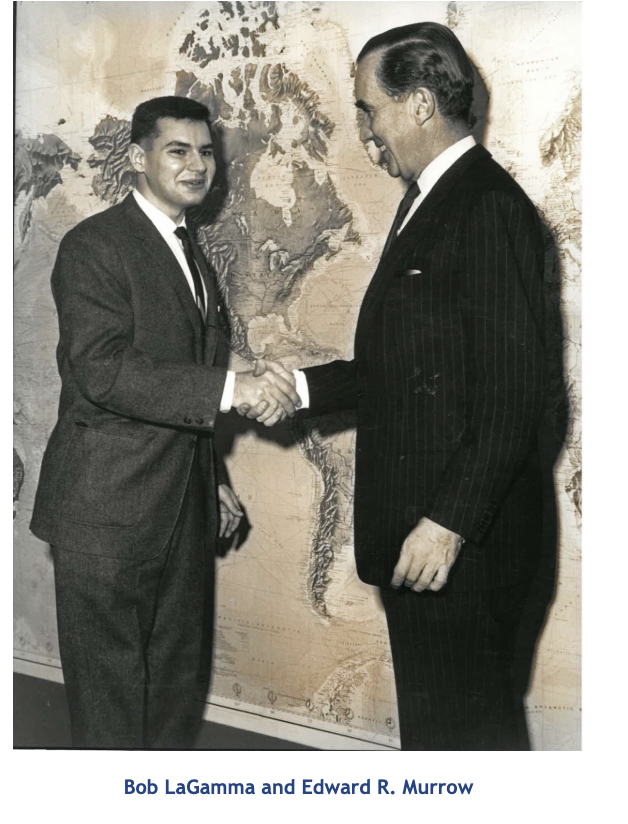Bob LaGamma, Two Appreciations
Bob LaGamma, Messages of Appreciationby Brooks Anne Robinson

My first tour was CAO Accra. While there, I married a Ghanaian political scientist whose work focused on democracy, which strengthened my interest in that part of our job. After Accra I went to Kaduna, Nigeria, marking my first assignment under Bob, who was then PAO Lagos. His deputy, Jeff Liteman, was my direct supervisor, so I experienced Bob’s leadership from a bit of a distance, as a light, but always supportive, touch. One of my goals was to get more northerners in our exchange programs, and Bob’s support (and certainly Jeff’s, who had served in Kano up north a decade earlier) was partially responsible for any success I had in that regard.
For my first domestic assignment, Jeff recruited me to be the FS Personnel assignments officer for Africa. Bob was the Africa Office Director for part of that time, so again, I witnessed his dedication to taking care of us Africanists. The next stop for me was the Cultural Coordinator job in African Affairs, still under Bob’s leadership. He told me that job was the best possible domestic assignment -- how right he was! No doubt I couldn’t have landed that prize without his endorsement. And his always-strong focus on the ECA side of things made that job extra satisfying. 
In recent years I’ve only seen Bob a couple of times. Last year I enjoyed a wonderful evening at his Reston home, where we regaled each other with stories from our time together in Nigeria. That evening I got the grand tour of his magnificent collection of African arts and crafts. So many treasures! Some of which are now in the collection of the Metropolitan Museum of Art in New York.
Through Bob, I had the pleasure of getting to know his daughter Alisa when she came to Ghana (where I live most of year) on a research trip for a project at the Met. I am so thankful that she and her siblings invited me to pay a farewell visit with Bob a couple of weeks before he passed away. When I arrived, he reached up and pulled my face to his and gave me a gentle kiss on the cheek. We reminisced, we laughed, we looked at old photos, we groaned over the state of democracy in the world, and he gave me a copy of his memoir. When he said, “You were always special,” it meant the world to me.
Truly, a great tree has fallen. May his soul rest in peace.
Brooks Robinson joined the Foreign Service in 1985. She retired from full-time work with the U.S. Department of State in 2013, then continued to work part-time until 2019. Throughout her diplomatic career she worked primarily on African affairs. Overseas, she served in public diplomacy positions at embassies in Ghana, Nigeria, and Swaziland, where her work focused largely on strengthening democratic values and supporting democratic institution building, and at the U.S. Mission to the United Nations in Geneva, Switzerland, where she focused on human rights and humanitarian issues in the multilateral arena. She also served as Deputy Chief of Mission in Liberia, and while working as a Re-employed Annuitant served as Acting Deputy Chief of Mission in Congo-Brazzaville and The Gambia. While in the United States, she served in the Bureau of African Affairs and the Bureau of Human Resources, and spent two years as the Diplomat in Residence at the University of California, Berkeley. Currently, she divides her time between Maryland and Ghana.
by Jeff Liteman
I met Bob in 1979 when he was PAO in Lome and I was on my way to become PAO in Kigali. Our meeting was relatively brief, but even so, I was impressed with his energy, commitment, and creativity – not to mention hospitality – and I came away thinking that I’d like to work with him someday.
That opportunity finally came nine years later. In 1988, after Rwanda, two years in the ancient northern Nigerian city of Kano, and five years as PAO in Port-au-Prince, I applied for, and was assigned to the position of DPAO in Lagos – then the capital of Nigeria – where Bob was the new PAO.
From the day I arrived to the day he left three years later, just prior to my own departure, I continued to be grateful for the opportunity to work alongside and learn from this knowledgeable, talented, and generous Foreign Service officer, whose love of Africa and belief in the importance of the work we were engaged in (he referred to it not as a job but as a calling) was manifest in everything he did.
We were more than mere colleagues. We were also good friends as well, and I recall with great fondness the many times I was invited to his home to partake of delicious dinners prepared by his loving wife, the late Anita, often in the company of some or all their children (depending on the time of the school year), Alisa, Adrian, Therese, Matthew, and Florence. Bob entertained us all by singing songs, telling stories, and recounting the plots of films he had recently watched.
We were also frequent tennis doubles partners, and the Calabash Cup we were awarded in 1991 is hanging on my wall to prove it. (He got one too, of course, but told me when I last visited him that his had gone missing.)
I could relate the details of many of our professional adventures – the memorable events related to the excursion around Nigeria with Dizzy Gillespie, for example; the time Bob somehow discovered that an African artifact that was about to be auctioned off somewhere in Europe was a piece that had been stolen from the Nigerian government, and enlisted us in the successful effort to get the auction called off and the piece returned to its rightful owner; and the unforgettable occasion when he and I had the honor of being received by the Oba of Benin, the hereditary king of what was once one of the largest empires in Africa – but here I want to highlight an episode that shows that Bob was not only a skilled professional public diplomat in his dealings with government officials, journalists, and artists, but also a man who loved the less exalted people he came in contact with.
Bob was traveling in the countryside a couple of hours from Lagos one day, driving on unpaved roads that had become muddy after a rainfall. His car slipped off the road and got stuck in the ditch, and there was no AAA to call to come and tow it out. Fortunately, some villagers soon appeared almost immediately as if out of nowhere, and pulled and pushed and got the car back on the road.
Among them was the chief of the village. After directing the efforts of his people to rescue Bob and his vehicle, he insisted that Bob accompany him back to the chief’s village.
Word had preceded them, and by the time they arrived, the villagers had prepared a midday feast for the visiting American dignitary.
For some, this would have been a pleasant one-off experience, but Bob was so taken with the people’s kindness that he “adopted” the village. He was named honorary chief, and went back several times to steep himself in traditional Nigerian culture (there were dances in his honor) and cuisine. I never knew the name of the village because he referred to it only as “his.” (“Plans for the weekend, Bob?” “Yeah, I think I’ll visit my village.”)
Throughout Bob’s long career in the Foreign Service and his second career as director of the Council for a Community of Democracies, he worked to make the world a better place, and he will be missed.
Jeff Liteman joined the Foreign Service in January 1968 and served in Afghanistan and Iran before returning to Washington, where he was assigned to the Office of East European Affairs and then served as director of Foreign Service Training. His next oversees assignments were as PAO Kigali, BPAO Kano, PAO Port-au-Prince, and DPAO Lagos. Back in DC, his posts included chief of Foreign Service Personnel and director of organization development in the new I Bureau before retiring at the end of 1997, 30 years after the adventure had begun. Thereafter he taught leadership skills for several years at the Foreign Service Institute and, at the invitation of the State Department, conducted leadership training and facilitated retreats in Accra and elsewhere in Ghana, as well as in Jerusalem and Ramallah.